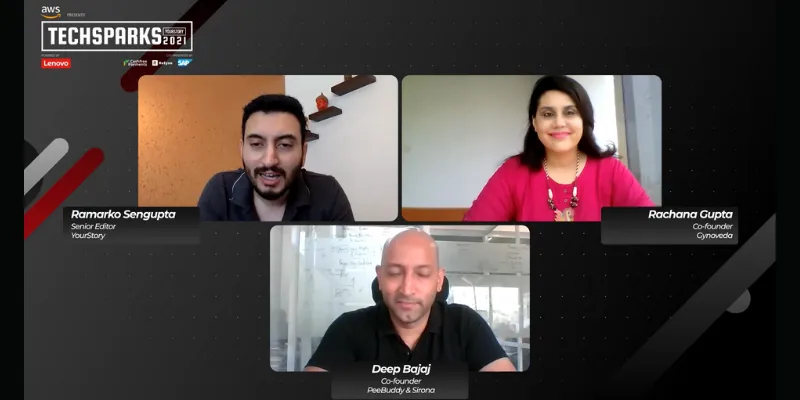How femtech startups are bringing women to the centre of the healthcare ecosystem
At TechSparks 2021, femtech entrepreneurs Rachana Gupta (Co-founder of Gynoveda) and Deep Bajaj (Co-founder of PeeBuddy and Sirona) deliberated on how to win customers and bank on risk-taking investors to grow the femtech industry.
In the early days of femtech startup , the startup’s co-founder Rachana Gupta, a Delhi woman who found the right medicines and community dealing with PCOS, sent Rachana a poem titled, Ek Ajnabee Undekhi Saheli Ho Tum.
She had expressed how her startup and the community of women she built became the unseen “friend” with whom she could discuss what she would have otherwise found uncomfortable talking with her mother and friends.
Rachana shared this anecdote at a panel discussion on Femtech: Disrupting Women's Healthcare at YourStory’s flagship event TechSparks 2021. India saw 40 femtech startups enter the market between 2018 and 2021.
For Rachana, building a community that offers a safe, non-judgmental place for everyday women is the anchor for any femtech startup.
According to her, the days of proclaiming that the future is female is long gone, at least when it comes to the healthcare ecosystem where women have long been ignored. With the rise of femtech, the entrepreneur believes the “present belongs to female”.
"Change is happening, and it should have happened at a much faster pace. Now, there is a lot of importance given to the fact that women are not just caregivers, but are also extremely crucial for their health and well-being," she said.
Deep Bajaj, Co-founder of and , said, "Two things are driving the change - women coming forward to solve for women and men realising there is a problem that needs to be solved where the other user is of the opposite sex."
Where there is a solution, there will be takers

As far as the consumer landscape is concerned, in the femtech industry, Rachana said women are done fighting the stigma and talking about it and want concrete solutions to their problems.
“The whole taboo concept is slowly moving towards the space of taking charge, which is extremely refreshing and empowering. Women are saying there’s enough noise about things, give us a solution. I'm in pain, don't give me gyaan but a product that will relieve me of the pain. And if you are offering the product, she's going to lap it up,” she explained.
The D2C boom has made solutions even more accessible, with most brands moving online.
"Women are not comfortable looking through hygiene-related products in physical stores whereas online purchases allow them to explore and ask any questions," Deep said.
He shared that with their first product PeeBuddy, which helps women stand and pee, the store owners did not believe the product would work at all, let alone sell. But it took off as soon as it was launched online.
Similarly, retailers believed that Indian women would never use Sirona’s menstrual cups, whereas half-a-million Indian women now use the product. “What has stood true in our cases is that customers help us push the envelope forward because if you offer them genuine solutions, there'll be hundreds of takers,” Deep added.
Investor interest in the space
When it comes to investments in the femtech industry, both entrepreneurs agreed that it is no longer about whether there are men or women investors behind the startups.
Deep said that smaller cheques are written to femtech startups because the category is tiny. Growing and encouraging the category in a big way would take investors with an appetite to build the category. “What you need are genuine risk-takers or venture capital investors in the ecosystem,” he added.
Rachana believes it also has to do with the fact that femtech is an impact-creating category. “Impact creation is all about demand generation. Women don't even know the solutions out there, and expanding the category begins with educating them,” she added. Her Mumbai-based period-first startup is backed by a team of all-male investors at Fireside Ventures.
Initially, when investors Rachana met would not fund her startup, she was often advised to speak to more women investors, implying they would understand Gynoveda.
“My first question was, where are the women in business? And the second thing is, it does not need a woman to understand this space but an individual who can grasp the potential of how big the problems women face are. Gender does not matter because magic happens when the vision is shared,” she said.
They agreed that the industry is more about collaboration than competition because many problems need to be solved.
Rachana observed that content-to-commerce would lead the way in building a solid customer base. More than just offers and festive deals, it would take good content to bring women on board.
"This is because she needs to understand why the product will solve the problem when everything else she's used so far has not worked? The larger mission is, if you want her to be an advocate of your brand, you need to give her the ‘why’,” Rachana said, emphasising that the total addressable market is humungous.

Edited by Rekha Balakrishnan








